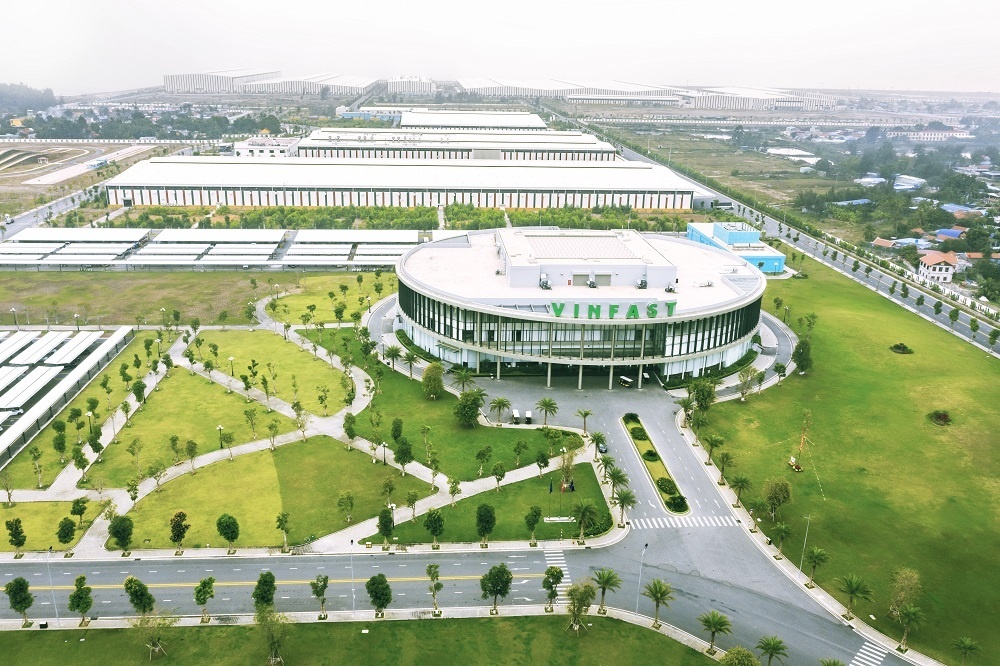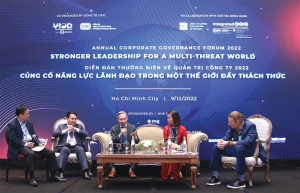Implement ESG criteria–or lose out on investment
How do you assess the implementation of internal audit in Vietnam’s publicly listed companies compared to other developed markets?
 |
| Anthony Pugliese, president and CEO of the Institute of Internal Auditors |
First and foremost, that businesses in Vietnam meet the requirements of Decree No.05/2019/ND-CP on internal audit, which came into effect in April 2019, is critical. The move is in line with international best practices, enhancing transparency and effectiveness in corporate governance. This is especially commendable as Vietnam looks to attract greater foreign investment.
On the other hand, talent acquisition and development are critical initial steps for Vietnam’s finance sector, since there isn’t a long history of internal audit here in Vietnam.
So training people who are skilled, whether it be accountants or auditors or from other professions, and how to be an internal auditor and what to look for as an internal auditor. It’s a unique skill set.
We are working to develop and promote the crucial training programmes with the Ministry of Finance to support the internal audit profession to be in line with the international best practices, such as the International Professional Practices Framework. In the current business climate, having an efficient and effective internal audit function is a true necessity.
Our fresh survey reveals that 14 per cent of Vietnamese businesses outsource internal auditors, citing the lack of talent as the major concern, while 9 per cent of companies state that they do not prepare internal auditing reports. However, the need to directly hire qualified internal auditors is important for a company’s development in the long term.
Looking on the bright side, the growth rate of the Vietnamese economy, the rapid development of the capital market, and the need for reform of financial control in recent years have required best practices in corporate governance and independent supervision of control and risk, thereby creating a premise for the development of internal audit activities in Vietnam.
In your opinion, how would the internal auditors address environmental, social, and governance (ESG) concerns in their daily operations?
In our recent survey in Vietnam, 42 per cent of correspondents said that their board of directors are negligent to implement ESG criteria in their internal audit report. ESG is becoming one of the most important issues around. The capital markets of the entire world are beginning to state clearly that if a company doesn’t follow the standards of ESG or develop sustainably, then they are probably going to see fewer people invest in them.
This applies across the board in Vietnam, from manufacturing to high technology to the food processing industry. For instance, if you export a huge number of goods into other capital markets, it really directly impacts Vietnam.
So as government becomes more and more acclimated, you will probably see laws coming out maybe through the Ministry of Finance, but it really is critical because that’s how people are investing their money now in a company that follows good solid practices of sustainability. And societal issues and governance issues.
Take the “culture” perspective, for example. Many investors don’t want to pour cash into a company with a negative culture; for example, that they don’t have good diverse hiring practices, or they do other things that are not socially acceptable.
It’s becoming more and more important for a company just to be profitable, and to have shareholder interest that they follow ESG, but there’s a lot of work out there on frameworks being built now.
How can internal auditors in Vietnam equip themselves with technology?
Internal auditors should familiarise themselves with some disruptive, cutting-edge technology like blockchain or AI because they are poised to radically alter the ways in which businesses, governments, and people conduct financial transactions. Even if a company itself isn’t using blockchain, its suppliers, clients, or partners very well may be.
For instance, blockchain is being widely used to record financial transactions. So, that’s then incumbent on the internal auditor to understand blockchain or they won’t be able to audit the underlying data. And it’s very complex compared to traditional financial reporting.
It’s a whole new mechanism and the internal auditor everywhere in the world has to be skilled, and we call it upskilling because not many people have those skills yet. There needs to be more so it affects the internal audit because companies are using AI.
Internal auditors should be using those as tools like robotic process automation, which could help internal audit increase productivity, expand its risk coverage, and help address the ongoing compliance burden by doing more with less. By taking advantage of tech, internal auditors can use more of their brain towards helping management make good strategic decisions.
 | Businesses identify ESG importance While many businesses in Vietnam now consider environmental, social, and governance goals as crucial in the journey to sustainable development, lack of knowledge and resources will remain a barrier for some time. |
 | Hospitality industry joins ESG Environmental, social, and governance criteria are still a new concept for most tourism and hotel businesses in Vietnam, but the success stories of a number of pioneering brands have contributed to inspiring businesses to embrace them more, with several companies picking up awards at a seminar organised by Vietnam Investment Review last week. |
 | Determination on show by businesses to be ESG ready Many businesses in Vietnam are advised to use environmental, social, and governance criteria as soon as possible as an effective tool for their sustainable development and improve their competitiveness. However, numerous challenges are facing them ahead. |
 | VinFast receives corporate ESG assessment from sustainalytics VinFast, Vietnam's first global electric vehicle manufacturer, has received an indicative Corporate Environmental, Social and Governance (ESG) Assessment from Morningstar Sustainalytics, a globally recognised research, ratings, and data firm. |
 | Businesses can show the way with ESG compliance The importance of sustainability to the bottom line, particularly a stronger corporate governance foundation, has risen to the top of the agenda for businesses large and small. |
What the stars mean:
★ Poor ★ ★ Promising ★★★ Good ★★★★ Very good ★★★★★ Exceptional
Related Contents
Latest News
More News
- Digital shift reshaping Vietnam’s real estate brokerages (December 31, 2025 | 18:54)
- Allen & Gledhill recognised as Outstanding M&A Advisory Firm (December 18, 2025 | 14:19)
- Inside Lego Manufacturing Vietnam (December 18, 2025 | 11:45)
- The next leap in Cloud AI (December 11, 2025 | 18:19)
- Vietnam’s telecom industry: the next stage of growth (December 11, 2025 | 18:18)
- Five tech predictions for 2026 and beyond: new era of AI (December 11, 2025 | 18:16)
- CONINCO announces new chairman and CEO (December 10, 2025 | 11:00)
- How AWS is powering the next-gen data era (December 09, 2025 | 13:14)
- Outlook in M&A solid for Singapore (December 08, 2025 | 10:31)
- Vietnamese firms are resetting their strategy for global markets (December 05, 2025 | 17:04)

 Tag:
Tag:




















 Mobile Version
Mobile Version